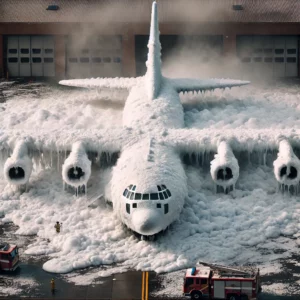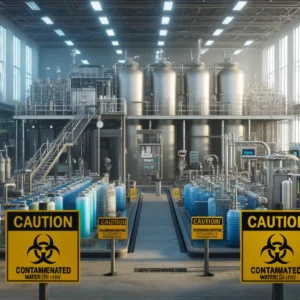New Legislation Would Join Growing National Movement to Protect First Responders from Occupational Cancer
Connecticut lawmakers are considering groundbreaking legislation to provide early cancer screenings for firefighters as cases continue to rise across the state. The bill, currently moving through the state legislature, would establish a comprehensive cancer screening program specifically designed for firefighters who face significantly higher cancer risks due to occupational exposures to carcinogens. If passed, Connecticut would join states like Utah, which enacted similar legislation on March 5, 2025, creating what officials there call “the most comprehensive firefighter cancer screening program in the country.” The initiative comes as research consistently shows cancer has become the leading cause of line-of-duty deaths among firefighters nationwide, with studies indicating they face a 9% higher risk of developing cancer and a 14% higher risk of dying from the disease than the general population.
5 Key Points
- Cancer now causes 66% of firefighter line-of-duty deaths nationwide according to data covering 2002-2019.
- The proposed Connecticut legislation would provide regular, specialized cancer screenings for firefighters at no out-of-pocket cost.
- Recent research shows even non-smoking firefighters develop high-risk lung nodules that would be missed under current screening guidelines.
- Connecticut already has a cancer presumption law that recognizes certain cancers as occupational hazards for compensation purposes.
- Similar early detection programs are gaining momentum nationally, including the federal FIRE Cancer Act reintroduced in Congress on February 26, 2025.
Why Are Firefighters at Higher Risk for Cancer?
Firefighters face an occupational hazard that extends far beyond the immediate dangers of entering burning buildings. Their chronic exposure to a toxic cocktail of carcinogens happens through multiple pathways that most people never encounter. When firefighters battle blazes in modern structures, they inhale and absorb through their skin a dangerous mix of chemicals released from burning synthetic materials, including benzene, formaldehyde, arsenic, and various other carcinogens. These exposures don’t end when the fire is extinguished—contaminated gear continues releasing harmful substances, and even fire stations themselves can become contaminated environments where firefighters spend significant time between calls. Waterbury Deputy Chief Richard Hart, political affairs director for the Uniformed Professional Fire Fighters Association of Connecticut, emphasized this reality when addressing lawmakers, stating: “The toxic atmosphere we work in on a daily basis holds hidden poisons ready to attack our bodies, long after the fire is out. Cancer in the fire service is real.”
Recent scientific research has strengthened the evidence linking firefighting to cancer. A groundbreaking study published in 2023 examined 1,347 firefighters who underwent low-dose CT scanning for lung cancer screening. Researchers discovered that 3% (41 firefighters) had high-risk lung nodules requiring intervention or surveillance. Alarmingly, over 85% of these high-risk cases would have been missed under current screening guidelines that focus primarily on smoking history rather than occupational exposure. Another concerning factor is the presence of per- and polyfluoroalkyl substances (PFAS) in firefighting foam and protective gear. These “forever chemicals” have been linked to various cancers and don’t break down in the environment or human body. This mounting scientific evidence has created urgency among Connecticut lawmakers to establish regular screening programs that could detect cancers at earlier, more treatable stages.
What Would the Connecticut Bill Provide?
The proposed Connecticut legislation aims to create a structured program for regular cancer screenings tailored specifically to the unique risks firefighters face. While current standard cancer screening recommendations are based on age, family history, and lifestyle factors like smoking, they often fail to account for the occupational exposures that make firefighters vulnerable to certain cancers at younger ages and without traditional risk factors. The bill would establish protocols for specialized screening that targets the cancers most common among firefighters, including prostate, brain, colon, and lung cancers. These screenings would be available to firefighters at no out-of-pocket cost, eliminating financial barriers to potentially life-saving early detection. The program would also implement a systematic approach to testing and follow-up care, ensuring that positive findings receive appropriate medical attention.
The bill builds upon Connecticut’s existing cancer presumption law, which already acknowledges certain cancers as occupational hazards for firefighters seeking workers’ compensation. That law, which took years to enact due to concerns from municipalities about costs, created the Firefighters’ Cancer Relief Fund as part of the state budget. The new screening initiative would complement these existing protections by focusing on prevention and early detection rather than compensation after diagnosis. For firefighters, this distinction is crucial—early detection dramatically improves survival rates and treatment outcomes for most cancers. As one Connecticut firefighter explained during testimony for the bill, the current situation often forces firefighters to make impossible choices: “Imagine that you’re battling cancer, you’re fighting for your very life and you’re wondering if you’re going to lose your home.” The proposed legislation aims to prevent such scenarios by catching cancers before they become advanced and life-threatening.
How Does This Bill Compare to Other States’ Efforts?
Connecticut’s proposed legislation joins a growing national movement to address the cancer crisis among firefighters. On March 5, 2025, Utah made headlines when its legislature unanimously passed HB65, establishing what Governor Spencer Cox called “the most comprehensive firefighter cancer screening program in the country.” Utah’s approach includes two key components: expanding the list of presumptive occupational cancers for firefighters from four to fifteen, and creating a systematic program for regular cancer screenings. The Utah program will be conducted by the Rocky Mountain Center for Occupational and Environmental Health, with the state covering screening costs for the first three years. Governor Cox expressed hope that other states would follow Utah’s example, stating, “Our true hope is that other states will copy us, so not only are we trying to save Utah firefighters, but this effort, we hope, will get some national legs.”
Texas has also recently advanced similar legislation. House Bill 198, known as the Wade Cannon Act, would require political subdivisions to provide free cancer screenings for firefighters starting in their fifth year of employment and continuing every three years thereafter. The Texas bill specifically targets screenings for colon, prostate, lung, and brain cancers. Meanwhile, at the federal level, U.S. Representative Josh Gottheimer (NJ-5) reintroduced the bipartisan Firefighter Investments to Recognize Exposure to Cancer Act (FIRE Cancer Act) on February 26, 2025. This legislation would ensure firefighters nationwide—both career and volunteer—have access to multi-cancer early detection tests at no out-of-pocket cost. The federal bill highlights how the issue transcends state boundaries and political divides, with sponsors from both parties recognizing the need to protect those who protect communities across America.
What Scientific Evidence Supports These Screening Programs?
Growing scientific evidence affirms the need for specialized cancer screening programs for firefighters. Research consistently shows firefighters develop certain cancers at higher rates than the general population, even when controlling for other risk factors. A groundbreaking study published in medical journals in 2023-2024 examined 1,347 firefighters who underwent low-dose CT scanning. Among the participants, 3.0% (41 firefighters) had high-risk lung nodules requiring intervention or surveillance. Perhaps most striking was the finding that only 14.6% of these high-risk cases would have qualified for screening under current guidelines, which primarily focus on age and smoking history rather than occupational exposure. This research suggests firefighting itself should be considered an independent risk factor for cancer, particularly lung cancer, and included in screening criteria.
The scientific understanding of how firefighters develop cancer continues to evolve. Studies have identified various pathways of exposure, including inhalation of toxic smoke, skin absorption through contaminated gear, and ingestion of particulates that settle on equipment and in fire stations. Research from Johns Hopkins University has specifically linked firefighting to higher rates of skin, prostate, brain, and colon cancers. The chemicals found in smoke—including benzene, arsenic, and formaldehyde—are well-established carcinogens. Additionally, the recent recognition of PFAS “forever chemicals” in firefighting foam and turnout gear has added another concerning dimension to cancer risk. These compounds don’t break down in the environment or human body and have been linked to kidney and testicular cancers among other health effects. This accumulating body of evidence provides strong justification for the specialized screening programs proposed in Connecticut and other states, potentially saving lives through early detection of occupational cancers.
FAQ
Q: Why are firefighters at higher risk for cancer?
A: Firefighters face regular exposure to numerous carcinogens released when synthetic materials burn, including benzene, arsenic, and formaldehyde. Their gear may contain PFAS “forever chemicals,” and contamination can spread to fire stations. Studies show they have a 9% higher risk of developing cancer and a 14% higher risk of dying from cancer than the general public.
Q: What types of cancer are most common among firefighters?
A: Research shows firefighters experience higher rates of several cancer types, including lung, brain, digestive system (particularly colon), kidney, bladder, and prostate cancers. They’re also twice as likely to develop mesothelioma, linked to asbestos exposure. These patterns reflect the specific carcinogens encountered in firefighting environments.
Q: How would early screening benefit firefighters?
A: Early detection significantly improves cancer survival rates and treatment outcomes. Many firefighters develop cancer at younger ages than typical screening guidelines recommend testing, and their occupational exposures create unique risk profiles. Specialized screening programs would catch cancers earlier when treatment is most effective and least invasive.
Q: How much would this screening program cost Connecticut?
A: The bill’s exact cost hasn’t been publicly specified, but similar programs in other states have allocated millions for implementation. Utah, for example, included $3.7 million in ongoing funding for its program. Connecticut would need to balance costs against potential savings from reduced treatment expenses and productivity benefits of catching cancers earlier.
Q: Does Connecticut already have any protections for firefighters who develop cancer?
A: Yes, Connecticut already has a cancer presumption law that recognizes certain cancers as occupational hazards for workers’ compensation purposes. This existing law created the Firefighters’ Cancer Relief Fund to provide benefits to firefighters diagnosed with job-related cancers. The new bill would complement this by focusing on prevention and early detection rather than compensation after diagnosis.
Q: Would volunteer firefighters be covered under this screening program?
A: While the bill details aren’t fully public, most comprehensive firefighter cancer programs aim to include both career and volunteer firefighters. Both groups face similar exposures to carcinogens, though sometimes at different frequencies. The federal FIRE Cancer Act specifically includes language covering volunteer firefighters, recognizing their shared risk profile.
Q: How does this bill compare to cancer screening initiatives in other states?
A: Connecticut’s proposal follows similar efforts in states like Utah, which passed HB65 on March 5, 2025, creating what Governor Cox called “the most comprehensive firefighter cancer screening program in the country.” Texas is advancing HB198 (the Wade Cannon Act) requiring free cancer screenings, and there’s a federal bipartisan bill called the FIRE Cancer Act that would ensure nationwide access to multi-cancer early detection tests for firefighters.
Citations
Deseret News. (March 5, 2025). Cancer is the leading cause of death for firefighters — and what lawmakers have done about it. https://www.deseret.com/utah/2025/03/05/firefighter-cancer-screening/
Josh Gottheimer, U.S. House of Representatives. (February 26, 2025). RELEASE: Gottheimer Reintroduces Bipartisan Legislation to Provide Early Detection Cancer Tests for Firefighters. https://gottheimer.house.gov/posts/release-gottheimer-reintroduces-bipartisan-legislation-to-provide-early-detection-cancer-tests-for-firefighters
National Institute for Occupational Safety and Health. (2023). Examination of Firefighting as an Occupational Exposure Criteria for Lung Cancer Screening. https://pubmed.ncbi.nlm.nih.gov/39164595/
Fox7 Austin. (March 11, 2025). Texas bill proposes mandatory cancer screenings for firefighters. https://www.fox7austin.com/news/texas-house-bill-198-wade-cannon-act-mandatory-cancer-screenings-firefighters
Insurance Journal. (March 9, 2015). Connecticut Bill Would Help Firefighters Claim Cancer Compensation. https://www.insurancejournal.com/news/east/2015/03/09/359815.htm
International Association of Fire Fighters. (2024). New Connecticut law protects fire fighters in case of cancer. https://www.iaff.org/news/new-connecticut-law-protects-fire-fighters-in-case-of-cancer/








